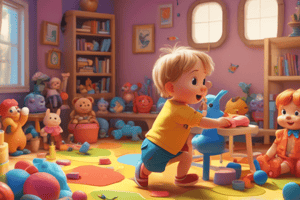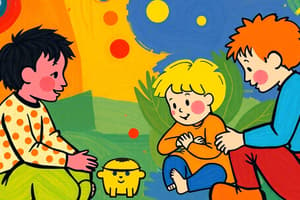Podcast
Questions and Answers
What type of play helps children develop coordination and balance?
What type of play helps children develop coordination and balance?
- Pretend Play
- Rules-based Play
- Large-Motor Play (correct)
- Fine-Motor Play
Which type of play is characterized by repetition until mastery of an action is achieved?
Which type of play is characterized by repetition until mastery of an action is achieved?
- Constructive Play
- Arts & Play
- Symbolic Play
- Mastery Play (correct)
In which type of play do children conform to a structure of preset rules?
In which type of play do children conform to a structure of preset rules?
- Constructive Play
- Rules-based Play (correct)
- Language Play
- Pretend Play
What type of play requires children to use various materials and strategies to achieve goals?
What type of play requires children to use various materials and strategies to achieve goals?
Which type of play enriches language skills through rhymes and stories?
Which type of play enriches language skills through rhymes and stories?
Which play type primarily involves imagination and transforming objects into toys?
Which play type primarily involves imagination and transforming objects into toys?
What characterizes Rough and Tumble Play?
What characterizes Rough and Tumble Play?
Which type of play combines various art forms and materials for self-expression?
Which type of play combines various art forms and materials for self-expression?
What is one of the consequences of play deprivation in children?
What is one of the consequences of play deprivation in children?
How does risk-taking play benefit children's development?
How does risk-taking play benefit children's development?
Which of the following best describes exploratory teaching strategies?
Which of the following best describes exploratory teaching strategies?
What is the primary goal of pedagogy in teaching?
What is the primary goal of pedagogy in teaching?
Which statement correctly describes experiential learning?
Which statement correctly describes experiential learning?
What effect does play have on children's emotional resilience?
What effect does play have on children's emotional resilience?
Which of the following is NOT an example of experiential learning?
Which of the following is NOT an example of experiential learning?
What role do parents play in facilitating risk-taking play?
What role do parents play in facilitating risk-taking play?
Flashcards
Importance of Play
Importance of Play
Play is a fun and essential activity that benefits children in various ways. It helps them develop their thinking, physical abilities, and social skills. Through play, children learn valuable skills for life.
Large-Motor Play
Large-Motor Play
This type of play involves large movements like running, jumping, climbing, and using swings. It helps children understand their bodies and how they move in space.
Fine-Motor Play
Fine-Motor Play
Fine-motor play focuses on small movements using hands and fingers. Activities like building with blocks, drawing, and playing with puzzles help children develop dexterity and coordination.
Mastery Play
Mastery Play
Signup and view all the flashcards
Rules-based Play
Rules-based Play
Signup and view all the flashcards
Constructive Play
Constructive Play
Signup and view all the flashcards
Pretend Play
Pretend Play
Signup and view all the flashcards
Symbolic Play
Symbolic Play
Signup and view all the flashcards
Risk-taking Play
Risk-taking Play
Signup and view all the flashcards
Role of Play in Child Development
Role of Play in Child Development
Signup and view all the flashcards
Consequences of Play Deprivation
Consequences of Play Deprivation
Signup and view all the flashcards
Pedagogy
Pedagogy
Signup and view all the flashcards
Explanatory Teaching Strategies
Explanatory Teaching Strategies
Signup and view all the flashcards
Exploratory Teaching Strategies
Exploratory Teaching Strategies
Signup and view all the flashcards
Experiential Learning
Experiential Learning
Signup and view all the flashcards
Teaching Strategies
Teaching Strategies
Signup and view all the flashcards
Study Notes
Play in Early Childhood
- Play is natural, entertaining, and rewarding for children
- Play enhances cognitive, physical, and social well-being
- Children learn important life skills through play
Types of Play
- Large-Motor Play: Involves large muscle movements (e.g., sliding, swinging)
- Develops coordination, balance, and spatial awareness
- Fine-Motor Play: Involves small muscle movements (e.g., puzzles, building toys)
- Develops dexterity and manipulation skills
- Mastery Play: Repetition of an action to achieve mastery (e.g., building a paper boat)
- Develops executive functioning skills
- Rules-Based Play: Play with established rules (e.g., games)
- Enhances negotiation and rule-following
- Constructive Play: Using materials to build or create (e.g., blocks, LEGOs)
- Develops problem-solving and planning skills
- Pretend Play: Engaging in imaginative scenarios (e.g., playing house)
- Enhances creativity and social skills
- Symbolic Play: Using objects to represent other objects (e.g., using a stick as a sword)
- Develops imagination and creativity through transforming objects
- Language Play: Using language creatively (e.g., rhymes, songs, storytelling)
- Enhances language development
- Arts & Play: Combining art forms with play (e.g., drawing, music, puppet shows)
- Enhances creativity and self-expression
Role of Play in Child Development
- Play is vital for healthy brain development
- Play enables children to express emotions and learn about relationships
- Improves emotional resilience and independence
- Promotes parent-child bonding through joint engagement
Consequences of Play Deprivation
- Increased depression
- Difficulty with impulse control
- Reduced self-regulation
- Emotional fragility
- Poorer interpersonal relationships
Pedagogy and Teaching
- Teaching effectively leverages children's cognitive, affective, and conative learning processes
- Learning happens through movement from receiving to internalizing and automatization
- Content Delivery is important, with Pedagogical strategies
- Teaching should be a mixture of explanatory (deductive/teacher led) and exploratory (inductive/student led) approaches
- These methods are important in providing both direct learning with delivery of knowledge and strategies that focus on active learning and discovery
- Effective Pedagogy creates a learning environment built on knowledge, skills and attitudes through actively engaging the child in various learning activities
Experiential Learning
- Learning by doing
- Hands-on experiences, experiments, and practical applications are crucial
- Include but not limited to; lab experiments, practise activities, field exercises and performances
Studying That Suits You
Use AI to generate personalized quizzes and flashcards to suit your learning preferences.




